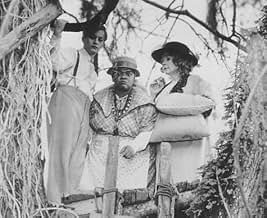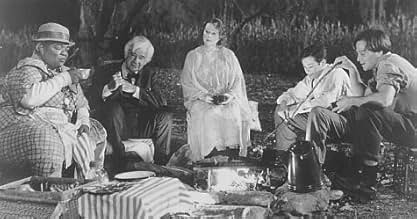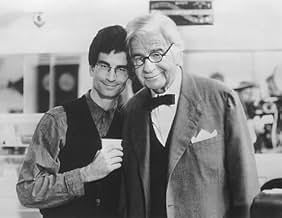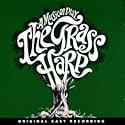VALUTAZIONE IMDb
6,6/10
20.207
LA TUA VALUTAZIONE
Rimasto orfano nel 1935, Collin si trasferisce dalle cugine di suo padre, Verena e Dolly.Rimasto orfano nel 1935, Collin si trasferisce dalle cugine di suo padre, Verena e Dolly.Rimasto orfano nel 1935, Collin si trasferisce dalle cugine di suo padre, Verena e Dolly.
- Regia
- Sceneggiatura
- Star
- Premi
- 3 vittorie totali
Recensioni in evidenza
Directed by Walter Mathau's son Walter, this is a superb adaptation of on one of Truman Capote's best stories about how Southern misfits in the 1930's help each other survive. Both Piper Laurie and Sissy Spacek, as the wealthy Talbo sisters, are perfectly cast and neither has ever been better. Walther Mathau, under his son's direction, in his most sympathetic roles, plays a retired judge. Every member of the spectacular cast is completely understandable: Jack Lemon and Mary Steenburgen are a pair of hilarious but unrelated con-artists. Nell Carter is the Talbo sister's very feisty cook, Joe Don Baker is the bumbling sheriff, Charles During the preacher, and Roddy McDowall is the gossipy barber. Look for Doris Roberts (Ray Romano's 'mom') as Mrs. Richards and for the director himself, Charles Mathau, as a barbershop regular.
A delightful movie from Truman Capote's memoir of his boyhood in the South. It is both tender and poignant. The acting is excellent. Piper Laurie as the orphan's free-spirited aunt is superb. Sissey Spacek as the other aunt is excellent. The atmosphere of that time, comes alive. A worthwhile movie for those with a tender heart.
...based on a short story by Truman Capote, and is mainly set in 1940. The film meanders at times, and the sad ending (right from the story, probably) is a bit of a letdown, but its still worth seeing for an excellent cast and graceful staging.
As the story begins in a prologue set in 1935, a young boy (Edward Furlong) is sent to live with his two spinster aunts following the death of his parents. These aunts might be sisters, but they are decidedly different; one is a hard-nosed businesswoman who owns many of the shops in town (Sissy Spacek), the other (Piper Laurie) is gentle and childlike, keeps house, and makes a homeopathic dropsy cure. After a few years pass, the two sisters have a falling out over taking the homeopathic cure into a factory setting, Laurie, Furlong, and maid Nell Carter decamp to the woods while waiting for Spacek to change her mind.
That is the main thrust of the plot, but there are all sorts of familiar faces in here as well: Walter Matthau as a retired judge and suitor for Laurie, Mary Steenburgen as a tent revivalist with 15 children, and brief cameos from the likes of Jack Lemmon, Roddy McDowell, Charles Durning, Scott Wilson, and Doris Roberts. This film is very little known, but it's worth tracking down for Laurie's performance especially.
As the story begins in a prologue set in 1935, a young boy (Edward Furlong) is sent to live with his two spinster aunts following the death of his parents. These aunts might be sisters, but they are decidedly different; one is a hard-nosed businesswoman who owns many of the shops in town (Sissy Spacek), the other (Piper Laurie) is gentle and childlike, keeps house, and makes a homeopathic dropsy cure. After a few years pass, the two sisters have a falling out over taking the homeopathic cure into a factory setting, Laurie, Furlong, and maid Nell Carter decamp to the woods while waiting for Spacek to change her mind.
That is the main thrust of the plot, but there are all sorts of familiar faces in here as well: Walter Matthau as a retired judge and suitor for Laurie, Mary Steenburgen as a tent revivalist with 15 children, and brief cameos from the likes of Jack Lemmon, Roddy McDowell, Charles Durning, Scott Wilson, and Doris Roberts. This film is very little known, but it's worth tracking down for Laurie's performance especially.
THE GRASS HARP was a novel by Truman Capote, based (in part) on his a youth, living with a pair of aunts in a southern town. Here his narrator hero is orphaned at an early age, and he is raised by his father's cousins (Sissy Spacek and Piper Laurie). Spacek is the actual head of the family, running four prosperous businesses in the small town, such as the town department store and town hotel (complete with Presidential suite). She is a humorless, hard working woman, as opposed to her sister, who is a loving, free spirited type, who (with her friend and assistant (Nell Carter) collects herbs for a patent medicine remedy for "dropsy". Edwin Furlong (and, earlier, Grayson Frick) play the hero of the film, Collin (the narration is by Boyd Gaines). The hero quickly finds himself in love with Laurie, and just respectful towards Spacek. As he grows up, he finds himself defending Laurie's reputation (she is seen as quite eccentric). The town people also fear Spacek, but rather openly dislike her.
Walter Matthau is retired Judge Cool, a sensible elderly man who "good" people consider a nut (he openly admits that there was nothing wrong with a true love affair between a white man and an African-American woman which led to the white man being run out of town). Matthau is having problems in his home with an unsympathetic grown son and the son's wife. Matthau's wife has died years before. Others in this well cast film include Jack Lemmon as a Dr. Ritt from Chicago, whom Spacek brings back home - and whom accidentally sets in motion the delayed rebellion of Laurie and the others against Spacek's stiff and respectable regime. Joe Don Baker plays the local chicken rancher/part-time sheriff (who hates having to cow-tow to Spacek). Charles Durning is the local minister, who is out for only respectable religious leaders (with Bonnie Bartlett as his equally stuffy wife). Mary Steenburgen is the religious threat - an unmarried mother of twelve who has a mobile revival tent in the back country, but whom is pretty likable for all one's questions about her revivalism. Sean Patrick Flannery is Riley, a young man who lives unconventionally, but whom turns out to be a pretty good friend to Collin. Roddy McDowall (in one of his last roles) plays Amos, the local barber.
Basically Capote uses his characters to punch holes in what "nice, conventional" small town people believe is proper behavior. Spacek is the leader of these people, who believe in organized Christianity, hard work and business, and straight-laced morality. Laurie, Matthau, Carter, Flannery, Steenburgen, and Furlong are all believers in doing what is natural, and from the heart. So as they begin working together they become a model and a danger for the "nice people". But as the tale progresses, the nice people find that what they believe in does not emotionally satisfy them. Indeed Spacek suffers several losses in the course of the film that she never expected.
Charles Matthau, Walter's son, directed this (very nicely - it is one of the best ensemble movies of recent years). It was also a rarity in the 1990s decade of Matthau-Lemmon films. Whereas GRUMPY OLD MEN, GRUMPIER OLD MEN, OUT TO SEA, and THE ODD COUPLE II were all comedies, this film is dramatic and the two actors only shared one scene (with Roddy McDowall in his barber shop) in the film. Also, Lemmon's character is less likable than usual in this film.
The title, by the way, refers to a statement by Laurie's character about how the grass gives off a music like a harp, which is actually the voices of all the people who ever inhabited the earth. It becomes a running metaphor in the film up to the conclusion.
Walter Matthau is retired Judge Cool, a sensible elderly man who "good" people consider a nut (he openly admits that there was nothing wrong with a true love affair between a white man and an African-American woman which led to the white man being run out of town). Matthau is having problems in his home with an unsympathetic grown son and the son's wife. Matthau's wife has died years before. Others in this well cast film include Jack Lemmon as a Dr. Ritt from Chicago, whom Spacek brings back home - and whom accidentally sets in motion the delayed rebellion of Laurie and the others against Spacek's stiff and respectable regime. Joe Don Baker plays the local chicken rancher/part-time sheriff (who hates having to cow-tow to Spacek). Charles Durning is the local minister, who is out for only respectable religious leaders (with Bonnie Bartlett as his equally stuffy wife). Mary Steenburgen is the religious threat - an unmarried mother of twelve who has a mobile revival tent in the back country, but whom is pretty likable for all one's questions about her revivalism. Sean Patrick Flannery is Riley, a young man who lives unconventionally, but whom turns out to be a pretty good friend to Collin. Roddy McDowall (in one of his last roles) plays Amos, the local barber.
Basically Capote uses his characters to punch holes in what "nice, conventional" small town people believe is proper behavior. Spacek is the leader of these people, who believe in organized Christianity, hard work and business, and straight-laced morality. Laurie, Matthau, Carter, Flannery, Steenburgen, and Furlong are all believers in doing what is natural, and from the heart. So as they begin working together they become a model and a danger for the "nice people". But as the tale progresses, the nice people find that what they believe in does not emotionally satisfy them. Indeed Spacek suffers several losses in the course of the film that she never expected.
Charles Matthau, Walter's son, directed this (very nicely - it is one of the best ensemble movies of recent years). It was also a rarity in the 1990s decade of Matthau-Lemmon films. Whereas GRUMPY OLD MEN, GRUMPIER OLD MEN, OUT TO SEA, and THE ODD COUPLE II were all comedies, this film is dramatic and the two actors only shared one scene (with Roddy McDowall in his barber shop) in the film. Also, Lemmon's character is less likable than usual in this film.
The title, by the way, refers to a statement by Laurie's character about how the grass gives off a music like a harp, which is actually the voices of all the people who ever inhabited the earth. It becomes a running metaphor in the film up to the conclusion.
If you're looking for an action-packed movie you probably won't enjoy this beautiful piece of film-making. You absolutely have to change gears to appreciate the wonderful and sensitive story it tells. Watching this movie is very much like watching an extended episode of The Waltons, right down to the narration and beautiful music. Good performances by all, and I especially enjoyed Piper Laurie's portrayal of sensitive and delicate Dolly Talbo, who lives under the thumb of her younger sister, played by Sissy Spacek. Ironically, Piper Laurie played Spacek's mother 19 years earlier in Carrie. The movie tells a tale of life and love in a small Southern town, and days gone by.
Having said that, the one criticism I have of the movie is that I didn't really CARE about the characters. I enjoyed very much watching the characters interact, and being reminded of life in a world that has almost completely disappeared. But I was more amused by them than passionate about them.
While this film may not be perfect, it's a wonderful movie; more intelligent than at least 90% of what comes out of Hollywood. As another reviewer suggested, if you have a couple of hours of quiet time, sit down with a glass of wine and enjoy.
Having said that, the one criticism I have of the movie is that I didn't really CARE about the characters. I enjoyed very much watching the characters interact, and being reminded of life in a world that has almost completely disappeared. But I was more amused by them than passionate about them.
While this film may not be perfect, it's a wonderful movie; more intelligent than at least 90% of what comes out of Hollywood. As another reviewer suggested, if you have a couple of hours of quiet time, sit down with a glass of wine and enjoy.
Lo sapevi?
- QuizIn "Carrie" (1976), Piper Laurie and Sissy Spacek played mother and daughter, respectively. Here, they play sisters.
- BlooperWhen the men fall out the treehouse and land on the ground, the leaves slide in a large square revealing the crash pad.
- Citazioni
Mrs. Peters: Shame on you Dolly Talbo, sittin up in that tree like a drunken Indian, smoking on cigarettes like a common... Floozy
Mrs. Buster: Floozy
Catherine Creek: Preacher lady don't you be callin Ms. Dolly here no floozy now, why I come down there and slap you bow-legged.
- ConnessioniReferenced in Walter Matthau: Diamond in the Rough (1997)
- Colonne sonoreRock of Ages
Written by Augustus Montague Toplady, Thomas Hastings
Performed by Bonnie Bartlett, Charles Durning
I più visti
Accedi per valutare e creare un elenco di titoli salvati per ottenere consigli personalizzati
- How long is The Grass Harp?Powered by Alexa
Dettagli
- Data di uscita
- Paese di origine
- Sito ufficiale
- Lingua
- Celebre anche come
- The Grass Harp
- Luoghi delle riprese
- Aziende produttrici
- Vedi altri crediti dell’azienda su IMDbPro
Botteghino
- Budget
- 8.000.000 USD (previsto)
- Lordo Stati Uniti e Canada
- 559.771 USD
- Fine settimana di apertura Stati Uniti e Canada
- 117.161 USD
- 13 ott 1996
- Lordo in tutto il mondo
- 559.771 USD
- Tempo di esecuzione
- 1h 47min(107 min)
- Colore
- Mix di suoni
- Proporzioni
- 1.85 : 1
Contribuisci a questa pagina
Suggerisci una modifica o aggiungi i contenuti mancanti
























